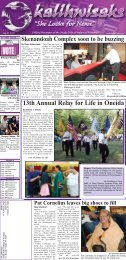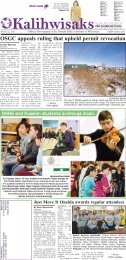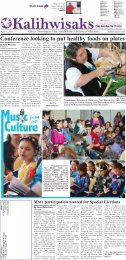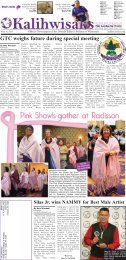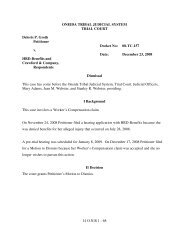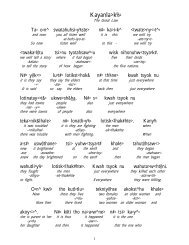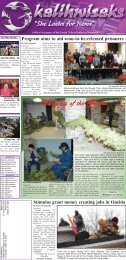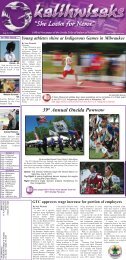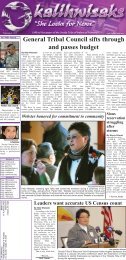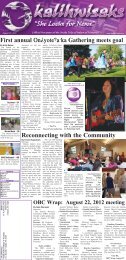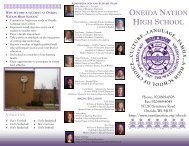April 21, 2011 - The Oneida Nation of Wisconsin
April 21, 2011 - The Oneida Nation of Wisconsin
April 21, 2011 - The Oneida Nation of Wisconsin
Create successful ePaper yourself
Turn your PDF publications into a flip-book with our unique Google optimized e-Paper software.
www.kalihwisaks.com Business<br />
<strong>Oneida</strong><br />
Homespun<br />
Harvest, Inc.<br />
fills niche in<br />
crafting world<br />
By Dawn Walschinski<br />
Kalihwisaks<br />
Mother and daughter<br />
team Amelia Cornelius<br />
and Kim Nishimoto are<br />
branching out with their<br />
new business <strong>Oneida</strong><br />
Homespun Harvest, Inc.<br />
to expand their vast crafting<br />
repertoire<br />
“It was a business that<br />
was already formed, and<br />
we were going to get a<br />
really good deal,” said<br />
Nishimoto.<br />
<strong>The</strong> duo purchased an<br />
industrial hem stitch<br />
machine that punches<br />
holes in fabric while<br />
simultaneously sewing<br />
around the holes to keep<br />
the fabric from fraying.<br />
“<strong>The</strong> purpose <strong>of</strong> it is<br />
for crocheters to add an<br />
edging … to make it<br />
more like it’s homemade<br />
and something you personally<br />
did. It’s just now<br />
coming back, but most <strong>of</strong><br />
the companies are based<br />
in Utah,” said Nishimoto.<br />
“We’re the only ones out<br />
in this area in the<br />
Midwest.”<br />
<strong>Oneida</strong> Homespun<br />
Harvest creates bibs and<br />
baby blankets with decorative<br />
crocheted edgings,<br />
and also sells kits for<br />
people to crochet themselves.<br />
“If (the fabric’s) not<br />
hemstitched, then they<br />
would have to punch a<br />
hole through with a crochet<br />
hook, and that just<br />
takes a lot more time.<br />
This is tons easier,” said<br />
Cornelius. “It could be<br />
used for (powwow)<br />
shawls, because the holes<br />
are already there.”<br />
Nishimoto does most<br />
<strong>of</strong> the crocheting, though<br />
Cornelius contributes.<br />
“Every time I go shopping,<br />
I’m looking for<br />
something that looks like<br />
it would be really cute for<br />
a baby,” said Cornelius<br />
who found a pattern with<br />
little green turtles.<br />
“Perfect for around<br />
here,” she said.<br />
<strong>The</strong> new business<br />
incorporates other items<br />
the two are known for,<br />
specifically their cornhusk<br />
dolls.<br />
“I’ve been doing them<br />
since I was 12,” said<br />
Cornelius who learned<br />
from her grandmother.<br />
In 1987, Cornelius and<br />
Nishimoto worked<br />
together to create dolls<br />
for the University <strong>of</strong><br />
<strong>Wisconsin</strong>-Stevens<br />
Mother and daughter expand expertise<br />
Kali photo/Dawn Walschinski<br />
Amelia Cornelius and daughter Kim Nishimoto display cornhusk<br />
dolls and crocheted baby items from their business <strong>Oneida</strong><br />
Homespun Harvest, Inc.<br />
Point.<br />
Cornelius stated<br />
Nishimoto does most <strong>of</strong><br />
the sewing on the doll’s<br />
outfits, and then<br />
Cornelius does the beading.<br />
“And then they come<br />
back to me, and I put hair<br />
on them” said Nishimoto.<br />
<strong>The</strong>ir dolls can be seen<br />
in shadowboxes at the<br />
Radisson Hotel and<br />
Conference Center and at<br />
Marriot Hotels in<br />
Washington DC and<br />
California. A display <strong>of</strong><br />
<strong>Oneida</strong> Chiefs can be<br />
viewed in the entrance <strong>of</strong><br />
the Norbert Hill Center.<br />
<strong>The</strong> duo also makes dolls<br />
on a smaller scale.<br />
“We did a wedding doll<br />
for the top <strong>of</strong> a wedding<br />
cake,” said Cornelius.<br />
For more information,<br />
contact <strong>Oneida</strong><br />
Homespun Harvest, Inc.<br />
at knishimoto@<br />
new.rr.com or call 920-<br />
964-2729.<br />
<strong>April</strong> <strong>21</strong>, <strong>2011</strong> • (Wisk) 5A<br />
Montana<br />
tribes look<br />
to stop<br />
megaloads<br />
MISSOULA, Mont.<br />
(AP) _ Two Indian tribes<br />
are asking to take part in<br />
a lawsuit aimed at preventing<br />
the hauling <strong>of</strong><br />
oversized equipment<br />
through Montana to the<br />
oil sand fields in Alberta,<br />
Canada.<br />
<strong>The</strong> Missoulian reports<br />
that Western Montana's<br />
Confederated Salish and<br />
Kootenai Tribes, as well<br />
as the Nez Perce <strong>of</strong><br />
Idaho, filed a motion in<br />
District Court in<br />
Missoula on Wednesday<br />
asking to have their say<br />
in the lawsuit against the<br />
state Department <strong>of</strong><br />
Transportation.<br />
Missoula County and<br />
three environmental<br />
groups say the department<br />
failed to analyze or<br />
disclose potential<br />
adverse effects in its<br />
environmental assessment<br />
<strong>of</strong> Imperial<br />
Oil/ExxonMobil's transportation<br />
plan. <strong>The</strong> MDT<br />
denies the claims.<br />
<strong>The</strong> tribes say they<br />
share many <strong>of</strong> the concerns<br />
<strong>of</strong> the plaintiffs, but<br />
have some <strong>of</strong> their own<br />
that might not otherwise<br />
be addressed in court.<br />
Imperial/Exxon is<br />
apparently modifying its<br />
original proposal to send<br />
207 oversized loads from<br />
Lewiston, Idaho, to the<br />
Canadian border in<br />
north-central Montana.<br />
Still, the companies continue<br />
to seek clearance to<br />
ship more than 100 loads<br />
up U.S. Highway 12<br />
through the Nez Perce<br />
Reservation in Idaho.<br />
___<br />
Information from:<br />
M i s s o u l i a n ,<br />
http://www.missoulian.c<br />
om<br />
Yurok<br />
tribe buys<br />
forest in<br />
Humboldt<br />
County<br />
KLAMATH, Calif.<br />
(AP) _ A Native<br />
American tribe is acquiring<br />
more than 34 square<br />
miles <strong>of</strong> ancestral land on<br />
Northern California's<br />
Redwood Coast.<br />
<strong>The</strong> Yurok Tribe says it<br />
completed the purchase<br />
Thursday <strong>of</strong> the<br />
Humboldt County property<br />
from the Green<br />
Diamond Resource<br />
Company.<br />
Tribal Chairman<br />
Thomas O'Rourke says<br />
the acquisition marks the<br />
long-sought return <strong>of</strong> the<br />
tribe's ancestral land and<br />
more than doubles its territory<br />
on the lower<br />
Klamath River.<br />
O'Rourke says tribe<br />
plans to create a salmon<br />
sanctuary and use tribal<br />
management practices to<br />
protect wildlife habitat<br />
and restore water quality.<br />
<strong>The</strong> tribe bought the<br />
land with help from the<br />
nonpr<strong>of</strong>it Western Rivers<br />
Conservancy and $18.75<br />
million from a state clean<br />
water fund.<br />
<strong>The</strong> property is home<br />
to Chinook salmon, coho<br />
salmon, rainbow trout<br />
and several imperiled<br />
bird species.



